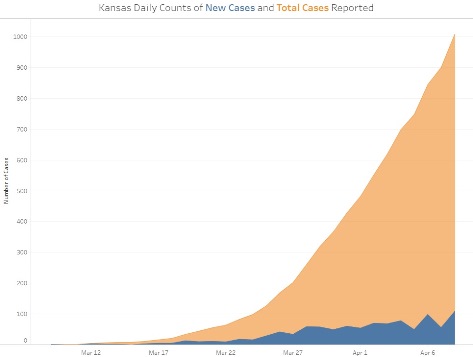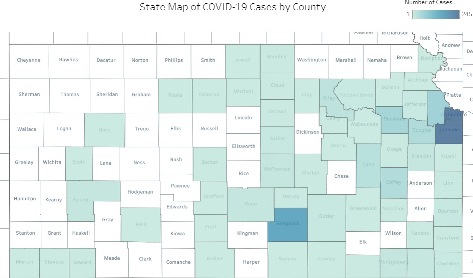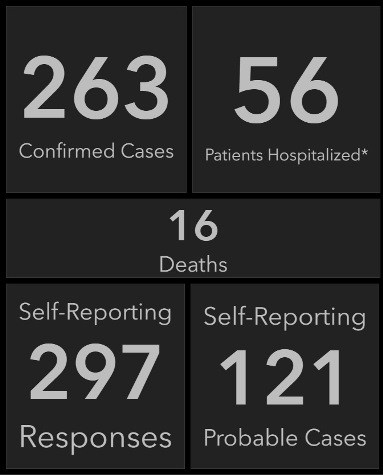
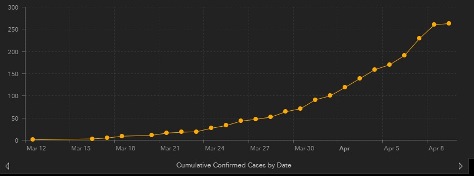
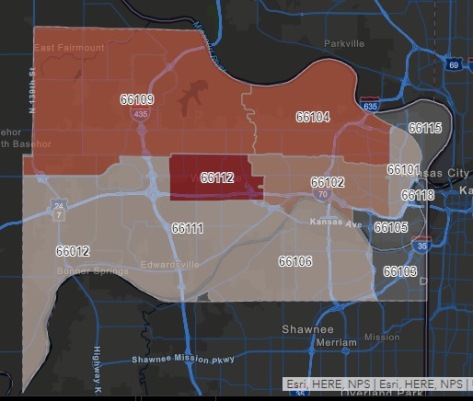
Wyandotte County reported four more COVID-19 deaths on Thursday morning, according to figures from the Unified Government COVID-19 webpage.
Deaths now total 16 for COVID-19 related cases in Wyandotte County, according to the UG COVID-19 website.
There were 263 positive cases in Wyandotte County as of 10:30 a.m. Thursday, according to the report. There were 228 cases at 11 a.m. Wednesday morning in Wyandotte County, according to the UG website.
According to the UG Health Department, one of the new deaths on Thursday was related to the Riverbend Post-Acute Center. The numbers of positive cases from the center now are 61, up from 48 on Wednesday, according to UG figures.
The state of Kansas reported 1,046 cases on Wednesday, with 38 deaths statewide, and 11 deaths in one day, its highest number of deaths so far. On Thursday, the 11 a.m. state report showed 1,106 positive cases, 42 statewide deaths and 263 hospitalizations in Kansas.
Johnson County reported 247 positive COVID-19 cases on Thursday morning, with 12 deaths, according to the Johnson County Health Department website. There were three more cases than Wednesday’s total on the KDHE website.
Doctors urge people to stay home this week
Doctors at the University of Kansas Health System today urged people to stay home, although there are some religious holidays including Passover and Easter coming up this week.
“All of those are causes for folks to come together,” Dr. Steve Stites, chief medical officer for KU Health System, said.
The rate of infection here is probably 5 to 10 percent having coronavirus, more or less, he added. That means, in a gathering of 50 people, five may have the coronavirus, he said. They may not have symptoms, and that is how the disease spreads, he said.
“Use good judgment. We can’t substitute medical judgment for your own personal judgment, and things that are important to individuals and people,” he said. “What we can say is we know how to bend a curve.
“Shelter at home, stay more than six feet apart, if you’re going to go out in public, wear a mask, cough into your elbow, don’t touch your face,” he said.
The number of COVID-19 patients at the University of Kansas Health System Thursday morning was 33, with nine patients in the intensive care unit, Dr. Dana Hawkinson, medical director of infection control, said.
The doctors said during a news conference Thursday that they are concerned about the increase in numbers in Wyandotte County.
Dr. David Lisbon, an emergency department physician, said data is always important, and may give a sense of how the disease is moving among different communities. It sometimes highlights what they know about health disparities.
“COVID is actually unmasking a lot of the health disparities and health inequities that exist,” Dr. Lisbon said.
A study of about 14 states showed that African-Americans and persons of color seemed to be disproportionately bearing the brunt of the disease, he said.
Without good testing data of the general population, Dr. Stites said the way they measure the disease in order to plan for the future is to use the number of people hospitalized and those on ventilators.
“Our data lags 10 to 14 days behind where the community is,” he said. It takes about 10 to 14 days to become sick and then hospitalized, he added. “That’s the importance of knowing where hospital data is.”
The hospital has been at the same number for four to six days and has fewer on ventilators now. That could mean the curve is flattening, or it could mean they are on a slow rise of the curve, he said. They are cautiously optimistic that they have begun to flatten the curve, but it’s too early to make that statement, he added.
“If we have done that, it’s because people took the shelter at home, the six feet away and all those other things, very seriously,” he said. The Core 4 group of local governments did a good job in closing public places including restaurants, bars and schools, he added.
“Purely from a health care perspective, I think we’re going to figure out that made a real difference,” he said.
Some local statistics on race of COVID-19 patients are not being released by governments.
Dr. Lisbon said the situation of possible health inequities reminds him of the saying, “We’re all in the same storm, but not in the same boat.”
There is evidence from Chicago and Louisiana, where African-Americans make up 17 percent of the population, that they’re bearing about 70 percent of the fatalities, he said, which is disproportionate.
There are factors such as income, education, and long-standing health care inequities, but they won’t know more about them unless they collect that data, Dr. Lisbon said.
Dr. Hawkinson said more data in many areas will be helpful. “We need to know how many infections overall are out there, what demographics are affected the most,” he said. He hopes to find the infection rate is lower in the United States than other countries.
Dr. Stites said a recent study in 14 states found of 1,400 patients who were hospitalized, 33 percent were African-American, which was disproportionately high. To do a strategy to prevent the spread of the disease, how much sense does it make to ignore hotspots, he asked. From a health perspective, that information is valuable, he said.
Dr. Lisbon also discussed factors such as being unemployed, covered by insurance, or if the patient had to go to work where he was further exposed, and those factors need to be considered. Social distancing is harder in certain heavily populated areas such as New York, he said.
“Not everyone can actually do all of our best recommendations, so that’s an issue, at times,” he said.
Recently, Johnson County announced it would do some random testing of its population.
In Wyandotte County, a Health Department drive-up clinic recently opened for patients who have COVID-19 symptoms, and it is necessary to contact them in advance to see if patients qualify for the test.
Dr. Stites said testing throughout the state is ramping up, with the Kansas Department of Health and Environment having more testing ability now. It will make a big difference, he said. It will help determine when it is safe to return to normal operations.
“We’re going to live in a post-COVID world,” he said, past the surge, and people will have to accept a little risk as the coronavirus will still be out there. Testing will help identify where the disease is, allowing the Health Department to get contacts and take actions to intervene.
On another topic, Dr. Lisbon said there has been a drop in overall numbers for patients coming into the emergency room since the start of the COVID-19 pandemic. While telemedicine is being used more for office visits, any individual who feels an emergency may still come to the emergency room, Dr. Lisbon said.
Victims of domestic violence or sexual assault will still be treated with compassion and dignity, the same way as pre-COVID-19, Dr. Lisbon said.
“There is evidence, even internationally, that individuals in those situations are now in somewhat of a constricted movement situation,” he said. Some feel they cannot get relief from a battering situation.
According to the Kansas City, Kansas, Police Department, temporary protection orders will remain in effect here in spite of recent court closures, and upcoming cases were being rescheduled later. Those who need protection orders may call 913-573-5153, option 5. The Wyandotte County District Attorney’s office recently announced that temporary protection orders would stay in place at least until May 27. Some local shelters are still open.
To view the KU Health System news conference, visit https://www.facebook.com/kuhospital/videos/2635178646591132/
The Wyandotte County COVID-19 website is at https://alpha.wycokck.org/Coronavirus-COVID-19-Information.
The state’s COVID-19 website is at https://govstatus.egov.com/coronavirus.
The CDC COVID-19 website is at https://www.cdc.gov/coronavirus/2019-nCoV/index.html.

